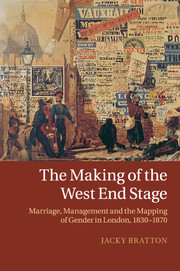 The Making of the West End Stage
The Making of the West End Stage Conclusion
from Part II - Making
Published online by Cambridge University Press: 05 November 2011
Summary
Beginning with Clement Scott, it has been a given of theatre history that when in 1865 Marie Wilton created the Prince of Wales's Theatre in the Tottenham Court Road a new era began. Her management – or rather, that of ‘The Bancrofts’ – has been hailed as, first, the dawn of naturalism on British stage, and, later, as the central betrayal perpetrated by the West End, leading to ‘mismanagement and snobbery’ that stifled the drama for a century. ‘The Bancrofts’ are credited with picture-framing the stage and so cutting off the dynamic flow between audience and players; with segregating and curtailing the demographic of the audience by higher prices and reorganised, segregated seating; with shortening the long mixed bill to a single piece, even sometimes without a ‘curtain-raiser’, to accommodate the changes in the fashionable hour of dining; and with inventing the long run, the box set and the society play, and so subordinating text to upholstery, and everything to profit. In fact, as I hope I have shown, most of these things had been begun, changed, adopted or discarded by the earlier managements I have been discussing. Vestris, one of the most visionary and innovative London managers of the century, had done everything from shortening the times of performance and modifying the auditorium to hiring co-ordinated set designers and costumiers at the Olympic in the 1830s. There had been experiments with evening-long single plays at most of the theatres, but the audiences had found them boring. Every new management of these jerry-built little theatres tried to clean them up and make them warmer, or cooler, and more comfortable. Marie Wilton learnt from her predecessors, and moved onwards through her own career with great good sense. For a time, these were the developments that worked; the second half of the nineteenth century saw many of these things become normal, because they were commercially successful.
The London theatre has always been a commercial theatre; since Davenant and Killigrew, all that happened on its stages was intended to be what would bring in a paying audience. The nineteenth-century managers, especially the women, were alert to the desires of their nineteenth-century customers, and the developments in programming that I have been discussing were their best estimate of what would work. Rather than wishing them away, wishing that theatre had been delivered more quickly into the hands of visionaries rather than stage professionals, that its centre was the dramatist rather than the event, I have tried in the foregoing chapters to think about what it was they offered and why their audiences liked it; why they succeeded. I have been attempting to look at those performances for themselves, in the context of all the other offerings of entertainment in the West End at mid-century, without accepting the prejudices and prescriptions of later generations; and the picture is lively, indeed bizarre; often funny, sometimes emotionally supercharged, both vivid and coarse. Not dull. By no means mundane or socially exclusive. Dickensian affect – the emotional overload of Smike and Pickwick, Barnaby and Dot – is accompanied by alienation effects like a female criminal hero wielding a carpenter's plane and burlesque fairies discussing the Poor Law in punning couplets. Fantastically clad women fighting or weeping, shooting their husbands or stabbing themselves in pantomime are intercut with beloved comics acting drunk and winking at the audience. Spectacular moving scenery and ghostly apparitions surround women in crinolines who shake audiences with Shakespeare's lines, and the never-never land of the stage gives back colour and feeling to anxious lives.
Information
- Type
- Chapter
- Information
- The Making of the West End StageMarriage, Management and the Mapping of Gender in London, 1830–1870, pp. 205 - 208Publisher: Cambridge University PressPrint publication year: 2011